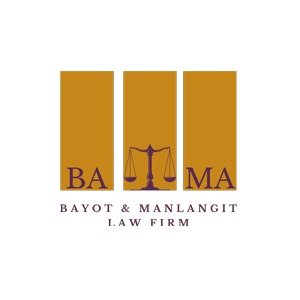Best Franchising Lawyers in Philippines
Share your needs with us, get contacted by law firms.
Free. Takes 2 min.
Or refine your search by selecting a city:
List of the best lawyers in Philippines
About Franchising Law in Philippines
Franchising in the Philippines has become an increasingly popular business model, allowing companies to expand their brand and reach through a network of franchisees. It involves a franchisor offering their business model, trademark, and support to a franchisee in exchange for a fee. In the Philippines, franchising spans a variety of sectors including food, retail, and services. The country is recognized as a mature franchising market with over 1,500 franchise brands, making it vital for stakeholders to understand the legal nuances to ensure smooth business operations.
Why You May Need a Lawyer
There are multiple scenarios in the franchising process where legal assistance may be necessary. These include:
- Drafting and reviewing franchise agreements to ensure compliance and fair terms.
- Negotiating terms with franchisors or franchisees to protect your interests.
- Assisting with regulatory compliance and ensuring adherence to the Intellectual Property Code and other relevant laws.
- Handling disputes between franchisors and franchisees, including mediation or litigation if necessary.
- Protecting intellectual property rights associated with franchising, such as trademarks.
Local Laws Overview
Franchising in the Philippines is primarily governed by the Intellectual Property Code and specific regulations set by the Department of Trade and Industry (DTI). Key aspects include:
- Intellectual Property Code: Protects the franchisor’s trademarks and trade secrets, vital for maintaining brand integrity.
- DTI Rules: The DTI promotes fair trade practices and ensures that franchisors provide full disclosure to potential franchisees.
- Philippine Franchising Association (PFA) Standards: Although not legally binding, these standards help promote ethical franchising practices.
- Any foreign franchisors must adhere to the Foreign Investments Act and may be required to get a relevant business permit.
Frequently Asked Questions
What is covered in a franchise agreement?
A franchise agreement typically includes the duration of the franchise, fees and expenses, territory rights, training and support, and obligations of both parties. It is crucial to have a lawyer review this to ensure fair and legal compliance.
Do I need to register my franchise agreement with any government body?
While there is no specific law mandating the registration of franchise agreements, it is advisable to consult the local government and ensure compliance with any disclosure and registration requirements, especially for foreign entities.
What are the fees associated with franchising?
Common fees include the initial franchise fee, royalties based on sales, marketing fees, and renewal fees. It is important to understand these costs upfront.
Can I sell my franchise?
Yes, but the process is governed by the terms of your franchise agreement. Some agreements may require the franchisor’s approval before selling your franchise.
What happens if a franchisor or franchisee breaches the contract?
Breaches are handled as per the dispute resolution mechanism detailed in the franchise agreement, which may include mediation, arbitration, or litigation.
Is franchising a regulated industry in the Philippines?
Yes, franchising is indirectly regulated under the provisions of the Intellectual Property Code, the DTI, and other relevant laws to ensure fair practices.
Can foreign franchisors operate freely in the Philippines?
Foreign franchisors can operate in the Philippines but must comply with the Foreign Investments Act and potentially obtain a business permit from the Board of Investments.
How important is trademark registration in franchising?
Trademark registration is crucial as it legally protects the franchisor's brand. A registered trademark is necessary to prevent unauthorized use and maintain brand integrity.
What is the Philippine Franchising Association (PFA)?
The PFA is a non-governmental organization representing the interests of franchisors and promoting ethical franchising practices through standards and guidelines.
What should be my first step if I am interested in becoming a franchisee?
Start by researching reputable franchises, assessing your capacity to meet the investment and operational requirements, and consult a lawyer to review any agreements before you commit.
Additional Resources
If you seek further information or assistance in franchising, consider reaching out to:
- Philippine Franchise Association (PFA): Offers guidance on best practices in franchising.
- Department of Trade and Industry (DTI): Provides resources and support for businesses in the Philippines.
- Intellectual Property Office of the Philippines (IPOPHL): Vital for trademark registration and intellectual property protection.
- Small Business Corporation (SBC): Offers financial and business advisory support to local businesses.
Next Steps
If you require legal assistance in franchising, it is advisable to consult with a lawyer who specializes in franchising law in the Philippines. Consider the following steps:
- Research and retain an experienced franchising lawyer by checking their credentials and past client reviews.
- Prepare all relevant documents and queries before your meeting to make the most out of your legal consultation.
- Discuss your objectives, potential legal issues, and the scope of the lawyer's services, including fees.
- Ensure that you understand all legal advice provided and that any action plan proposed aligns with your business goals.
Lawzana helps you find the best lawyers and law firms in Philippines through a curated and pre-screened list of qualified legal professionals. Our platform offers rankings and detailed profiles of attorneys and law firms, allowing you to compare based on practice areas, including Franchising, experience, and client feedback.
Each profile includes a description of the firm's areas of practice, client reviews, team members and partners, year of establishment, spoken languages, office locations, contact information, social media presence, and any published articles or resources. Most firms on our platform speak English and are experienced in both local and international legal matters.
Get a quote from top-rated law firms in Philippines — quickly, securely, and without unnecessary hassle.
Disclaimer:
The information provided on this page is for general informational purposes only and does not constitute legal advice. While we strive to ensure the accuracy and relevance of the content, legal information may change over time, and interpretations of the law can vary. You should always consult with a qualified legal professional for advice specific to your situation.
We disclaim all liability for actions taken or not taken based on the content of this page. If you believe any information is incorrect or outdated, please contact us, and we will review and update it where appropriate.
Browse franchising law firms by city in Philippines
Refine your search by selecting a city.

















